
Sunset in Paradise
Due to an unexpected - yet delightful - phone call at 10:30 thing morning today's postings are a bit delayed. We will return to our regular schedule tomorrow.
Don't forget to visit our sister blog!

| 1396 | The last great Christian crusade, led jointly by John the Fearless of Nevers and King Sigismund of Hungary, ends in disaster at the hands of Sultan Bajazet I's Ottoman army at Nicopolis. | |
| 1598 | In Sweden, King Sigismund is defeated at Stangebro by his Uncle Charles. | |
| 1775 | British troops capture Ethan Allen, the hero of Ticonderoga, when he and a handful of Americans try to invade Canada. | |
| 1789 | Congress proposes 12 new amendments to the Constitution. | |
| 1804 | The 12th Amendment is ratified, changing the procedure of choosing the president and vice-president. | |
| 1846 | American General Zachary Taylor's forces capture Monterey, Mexico. | |
| 1909 | The first National Aeronautic Show opens at Madison Square Garden. | |
| 1915 | An allied offensive is launched in France against the German Army. | |
| 1918 | Brazil declares war on Austria. | |
| 1937 | German Chancellor Adolf Hitler meets with Italian Premier Benito Mussolini in Munich. | |
| 1938 | President Franklin Roosevelt urges negotiations between Hitler and Czech President Benes over the Sudetenland. | |
| 1942 | The War Labor Board orders equal pay for women in the United States. | |
| 1943 | The Red Army retakes Smolensk from the Germans who are retreating to the Dnieper River in the Soviet Union. | |
| 1959 | President Eisenhower and Soviet Premier Khrushchev begin Camp David talks. | |
| 1974 | Scientists warn that continued use of aerosol sprays will cause ozone depletion, which will lead to an increased risk of skin cancer and global weather changes. | |
| 1981 | Sandra Day O'Connor, the first female Supreme Court Justice, is sworn in. |

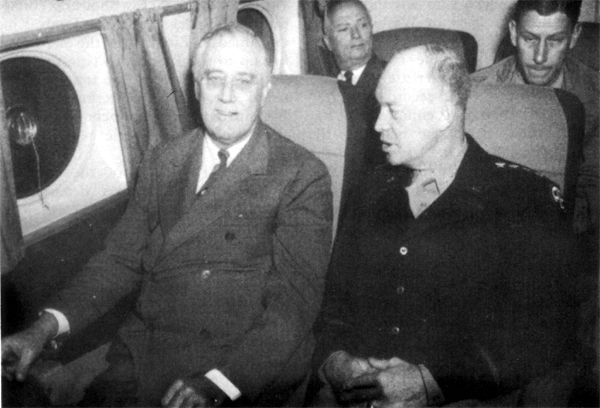
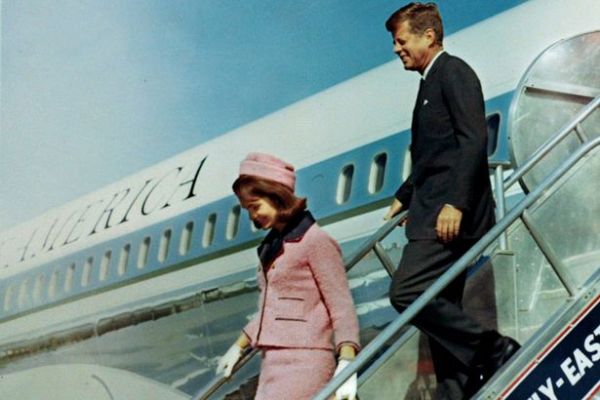

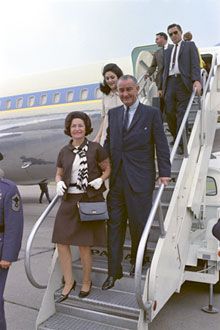 *
President Lyndon Johnson had all of the passenger seats unbolted and
turned around so that they faced the rear of the plane -toward his
compartment. He also ripped out the cherry wood divider separating his
compartment from the rest of the plane and replaced it with clear
Plexiglass, Jerry Ter Horst writes in The Flying White House, "so that he could keep an eye on everybody -and they on him."
*
President Lyndon Johnson had all of the passenger seats unbolted and
turned around so that they faced the rear of the plane -toward his
compartment. He also ripped out the cherry wood divider separating his
compartment from the rest of the plane and replaced it with clear
Plexiglass, Jerry Ter Horst writes in The Flying White House, "so that he could keep an eye on everybody -and they on him." * Stealing objects stamped with the presidential seal has long been one of the perks of being invited to fly aboard Air Force One.
Still, not every president has approved: President Carter was so
offended by the practice that he ordered the plane's expensive engraved
crystal ashtrays, candy dishes, and wine glasses removed and had them
replaced with plastic containers and paper cups.
* Stealing objects stamped with the presidential seal has long been one of the perks of being invited to fly aboard Air Force One.
Still, not every president has approved: President Carter was so
offended by the practice that he ordered the plane's expensive engraved
crystal ashtrays, candy dishes, and wine glasses removed and had them
replaced with plastic containers and paper cups.When I took over the plane after it came back from Texas, I found an empty larder. We had no presidential china, no Air Force One silverware, no Air Force One cigarettes, no cocktail napkins, no towels -not even any paper products like toilet tissue. They were all gone. Even LBJ's special executive chair -the one we called "the throne"- was unbolted from the floor and taken away. The presidential stateroom was bare of pillows, blankets, and everything else that bore the presidential seal. I couldn't believe my eyes.
“I appreciate the fact that she is on the ground, safe and sound. And I don’t think she knows just how worried some of us were,” Romney said. “When you have a fire in an aircraft, there’s no place to go, exactly, there’s no — and you can’t find any oxygen from outside the aircraft to get in the aircraft, because the windows don’t open. I don’t know why they don’t do that. It’s a real problem. So it’s very dangerous. And she was choking and rubbing her eyes. Fortunately, there was enough oxygen for the pilot and copilot to make a safe landing in Denver. But she’s safe and sound.”As HuffPo points out, Romney has his facts slightly off:
The main reason airplane windows don't open is because there isn't enough oxygen at cruising altitude to keep passengers alive. (The fear of window or cabin failures, which would lead to potentially fatal hypoxia, is why many planes are equipped with emergency oxygen masks.)Here's another reason the windows don't open at 40,000 feet: Because you're traveling at 550 miles per hour, which can slam a window awfully hard on your finger (in addition to ripping the window right off). Another reason, the air temperature is 70F below zero, which might give the passengers a slight chill when the guy in front of you refuses to close his window and the 500 mile per hour -70F wind is blowing in Mrs. Romney's face. (Then there's the air pressure differential...)
"You can’t find any oxygen from outside the aircraft to get in the aircraft, because the windows don’t open," Romney told the Times, suggesting that additional oxygen in the cabin during the electrical malfunction could've alleviated the problem. In fact, if there were an electrical fire on board, additional oxygen would have fed the flames.
To review, here is the circumstantial evidence:Someone in the traditional media needs to ask Mitt Romney directly whether he did or did not close his Swiss bank account during the amnesty program. But they also need to demand that he release the full details of his taxes like every other candidate for president in modern times.
i) Romney closed ONLY his Swiss UBS Account, not Caymans or Bermuda or Luxembourg. Hence, he cannot claim "bad optics for a campaign" as the alternative explanation;
ii) Romney closed the UBS account during the time required to receive amnesty;
iii) Romney omitted from his public disclosure of his 2010 returns the specific information about the UBS account;
iv) Romney took six extra months to prepare his 2011 returns, disclosing them in the countdown to the election, whereas he could have disclosed 2009 immediately with 2010, getting all that bad news out at once, during the primary, so that it would be ancient history by now. That is strong evidence that 2009, that would have shown the amnesty with flashing lights, was too toxic.
President Barack Obama hit back hard in a "60 Minutes" interview broadcast Sunday at Mitt Romney's criticisms of his handling of Syria and Iran, saying that if the repugican standard-bearer "is suggesting that we should start another war, he should say so."
Obama also brushed aside talk that Israeli Prime Minister Benjamin Netanyahu has been pressuring him to take a harder line on Iran's suspicious nuclear program — source of some of Romney's sharpest campaign-trail criticisms.
"When it comes to our national security decisions-- any pressure that I feel is simply to do what's right for the American people. And I am going to block out any noise that's out there," the president said.
"And in a 2007 interview with Glenn Beck, Romney called the fact that people without insurance were able to get "free care" in emergency rooms "a form of socialism."As HuffPost notes, Romney was singing a completely different tune last night on 60 Minutes:
"When they show up at the hospital, they get care. They get free care paid for by you and me. If that's not a form of socialism, I don't know what is," he said at the time.
Downplaying the need for the government to ensure that every person has health insurance, Mitt Romney on Sunday suggested that emergency room care suffices as a substitute for the uninsured.So the new "conservative" Mitt Romney is now in favor of "socialism."
"Well, we do provide care for people who don't have insurance," he said in an interview with Scott Pelley of CBS's "60 Minutes" that aired Sunday night. "If someone has a heart attack, they don't sit in their apartment and die. We pick them up in an ambulance, and take them to the hospital, and give them care. And different states have different ways of providing for that care."
The repugican presidential hopeful Mitt Romney came to the Golden State for a two-day series of high-profile fundraisers and reportedly took a shot at California in front of a $25,000 a ticket crowd in Del Mar.
Romney “took a pretty big shot at California,” according to a pool reporter.
“He said that under President Obama we’re becoming a lot more European and that the state of California was something he didn’t want to see the rest of the U.S. look like in a few years,” a pool reporter related.
The study examined 98 election-related statements by the presidential candidates, their surrogates, and campaign ads fact-checked by PolitiFact.com from June 1 to September 11. Major findings:Get ready for repugicans to, coincidentally all in unison, denounce the fact-checkers, in a massive playing of the refs designed to push fact-checkers further to the right. But the larger point remains: What are fact-checkers to do if "hypothetically" one party is taken over by extremists who have decided that the only way they can win is to lie?
PolitiFact checked the assertions of Democrats slightly more often than those of repugicans (54% vs. 46% of all statements).
However, PolitiFact rated Democratic statements as “mostly true” or “entirely true” about twice as often as Republican statements -- 42% true ratings for Democrats vs. 20% for repugicans.
Conversely, statements by repugicans were rated as entirely false about twice as often as Democratic statements – 29% false ratings for repugican statements vs. 15% false ratings for Democrats. (This includes categories labeled “false” and “pants on fire.”)
The same pattern holds for statements made directly by the presidential candidates and their campaigns. A majority of the Obama campaign’s statements (55%) were rated as true or mostly true, compared to one out of four statements (26%) by the Romney campaign.
The difference is even greater at the other end of the spectrum, where 26% of the Romney campaign’s statements were rated as either false or “pants on fire,” compared to only 5% of the Obama campaign’s statements.
In October 2004 the Drudge Report published a memo Halperin sent to ABC News staff about coverage of the U.S. presidential election directing them not to "reflexively and artificially hold both sides 'equally' accountable" and that both John Kerry and George W. Bush used "distortion" in their campaign, but that Kerry’s distortions were not "central to his efforts to win."[8] Halperin was criticized by conservatives who used the memo to reinforce long-standing complaints of media bias.Wingnuts had a conniption fit. But what if Halperin was right. Or more to the point, why should we assume necessarily that Halperin was wrong? Why is it impossible that one political party, one presidential candidate, could lie more than the other?
The new laws include purges of people suspected of not being citizens in 16 states that unfairly target Latinos, the civil rights group Advancement Project said in the study to be formally released on Monday.
Laws in effect in one state and pending in two others require proof of citizenship for voter registration. That imposes onerous and sometimes expensive documentation requirements on voters, especially targeting naturalized American citizens, many of whom are Latino, the liberal group said.
Nine states have passed restrictive photo identification laws that impose costs in time and money for millions of Latinos who are citizens but do not yet have the required identification, it said.
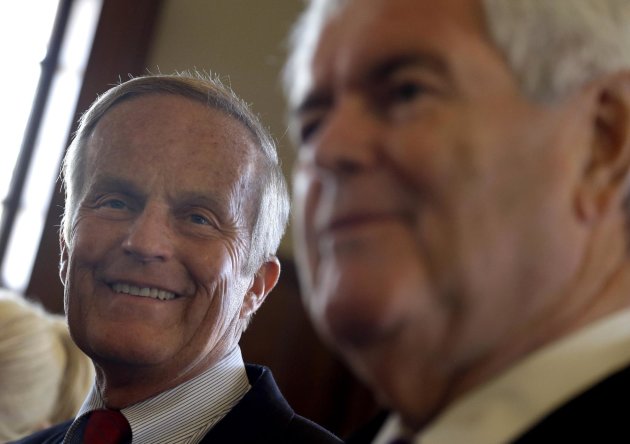
James Murdoch will be given more responsibility over News Corp's U.S. television operations more than a year after he became a central figure in the company's telephone hacking scandal in the UK, two sources familiar with the matter said.
News of the promotion comes on the heels of a ruling earlier on Thursday by a UK regulator that appears to have cleared pay-TV company BSkyB of any connection to the scandal that tainted News Corp last year.
The 39-year-old son of News Corp chairman Rupert Murdoch will be given a larger, more operational role in the Faux Networks Group, which oversees Faux's broadcast network and its cable channels that include FX, National Geographic and Fox sports channels, according to two people with knowledge of the move.
Recession-hit Spaniards will this week be told to swallow yet more austerity as the government prepares a fresh round of reforms and another budget filled with spending cuts and tax increases that will allow it to seek a bailout from euro-zone partners. - More
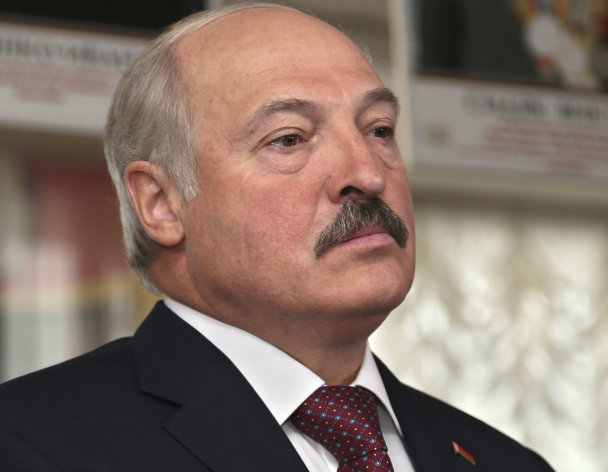 International observers on Monday condemned a weekend vote in Belarus in which not a single opposition politician won a parliament seat. The election looks set to deepen the former Soviet nation's diplomatic isolation.
International observers on Monday condemned a weekend vote in Belarus in which not a single opposition politician won a parliament seat. The election looks set to deepen the former Soviet nation's diplomatic isolation.
Critics say it will allow a foreign elite to set up a low-tax, sympathetically regulated enclave where they can skirt labour standards and environmental rules.Chicago's economists have a grand tradition of helping military dictators establish unregulated zones where human rights take a backseat to profit, including their enormous contributions to Augusto Pinochet's murderous regime, which established the fundamental kinship between high profits and death squads.
"This would violate the rights of every citizen because it means the cession of part of our territory to a city that would have its own police, its own juridical power, and its own tax system," said Sandra Marybel Sanchez, who joined a group of protesters who tried to lodge an appeal at the supreme court.
Ismael Moreno, a correspondent for the leftwing Nicaraguan magazine Envio, compared the charter cities to the banana enclaves, which were run on behalf of a foreign elite. He also spelled out the environmental risks, particularly if one of the development sites is the Sico valley, an area of virgin forest on the Mosquito Coast.
"This model city would end up eliminating the last agricultural frontier left to us," he wrote.

That may fit a pattern some Americans see of so many kids from Asia who excel in everything from music to science as they embrace a new culture. But it holds for all immigrants, including those from Mexico who often arrive here in a desperate flight from poverty.But like the famed Chinese proverb about wealth not lasting three generations, all that academic advantage evaporates for their grandchildren. Lee Dye of ABC News has the story: here.
It doesn't mean that a poor kid who arrives here as a preteen will do better than an American kid from a wealthy family that values education, of course. But compared to an American youth with a similar background, the immigrant will have certain advantages.
"They have higher expectations, they make a higher effort, and they have better cultural tools," sociologist Lingxin Hao, lead author of the study, said in a telephone interview. "Their culture is not just American."
They have the experience of living their first years in a very different culture, "so they have cultural diversity and they are able to take the best part of both and use it while in school," she added. That will continue to help them transition into adulthood.
The study indicates the immigrants are more likely to succeed because they arrived here with high expectations, their parents expect them to work harder, and it's likely they will have a stronger relationship than their American peers with their teachers.
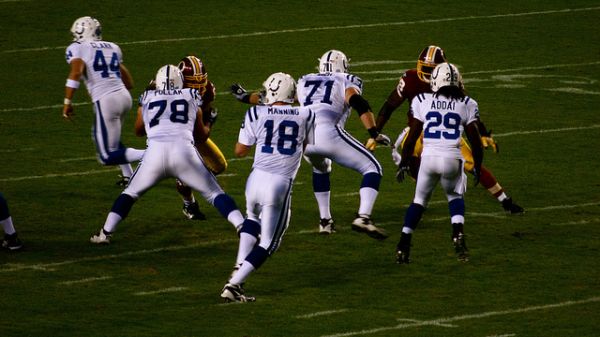
In other words, if you tally up everything that happens between the time the ball is snapped and the play is whistled dead by the officials, there's barely enough time to prepare a hard-boiled egg. In fact, the average telecast devotes 56% more time to showing replays.More
So what do the networks do with the other 174 minutes in a typical broadcast? Not surprisingly, commercials take up about an hour. As many as 75 minutes, or about 60% of the total air time, excluding commercials, is spent on shots of players huddling, standing at the line of scrimmage or just generally milling about between snaps. In the four broadcasts The Journal studied, injured players got six more seconds of camera time than celebrating players. While the network announcers showed up on screen for just 30 seconds, shots of the head coaches and referees took up about 7% of the average show.

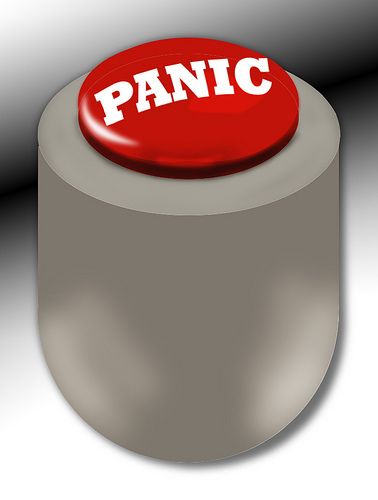 Humanity.
It had a good run, wouldn't you say? Now it's over. According to the
UK's National Pig Association, pig farms will be unable to keep up with
production necessary to feed the world population the pork-based
nutrients necessary to live:
Humanity.
It had a good run, wouldn't you say? Now it's over. According to the
UK's National Pig Association, pig farms will be unable to keep up with
production necessary to feed the world population the pork-based
nutrients necessary to live:New data shows the European Union pig herd is declining at a significant rate, and this is a trend that is being mirrored around the world. Pig farmers have been plunged into loss by high pig-feed costs, caused by the global failure of maize and soya harvests. All main European pig-producing countries report shrinking sow herds.More

According to a Nanchang official, in recent years the number of beggars turning up for the local religious festival has increased to a point where they’re actually making temple visitors uncomfortable with their lamenting and pleading for some pocket change. So this year, to make sure everyone attending the festivities will be left alone, they decided to separate the hundreds of beggars in small metal cages around the festival grounds, where people can still give donations if they wish, but without being followed around and nagged while they’re on a day out with their family.Human rights activists are not amused:
“The beggars are quite comfortable in their cages, people send them food and water as gifts. In a way it is better for them there than having to find a place on the busy streets,” festival organizers said.” The beggars can leave whenever they like but they have to leave the city too, they can’t go into the fair,’ they added.
“Do they want people to believe the region has no poor people and just put on a good show? These people need help. We should not be allowing them to be locked away in cages. These people are human beings too,” one said, while another commented “They are treating them like zoo animals. What will they have to do next – tricks for their food? This is nothing but public humiliation!”Oddity Central has the post: here
